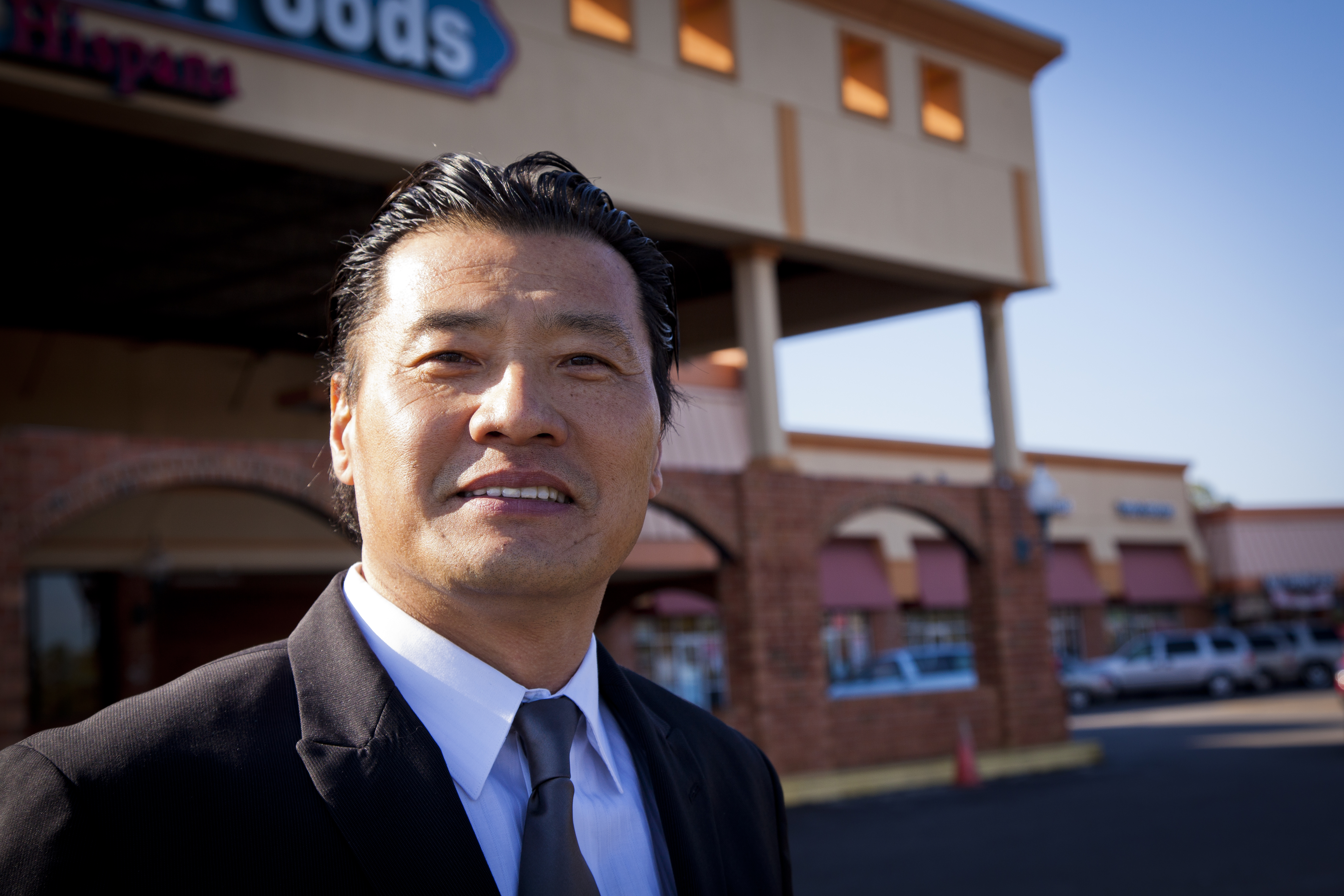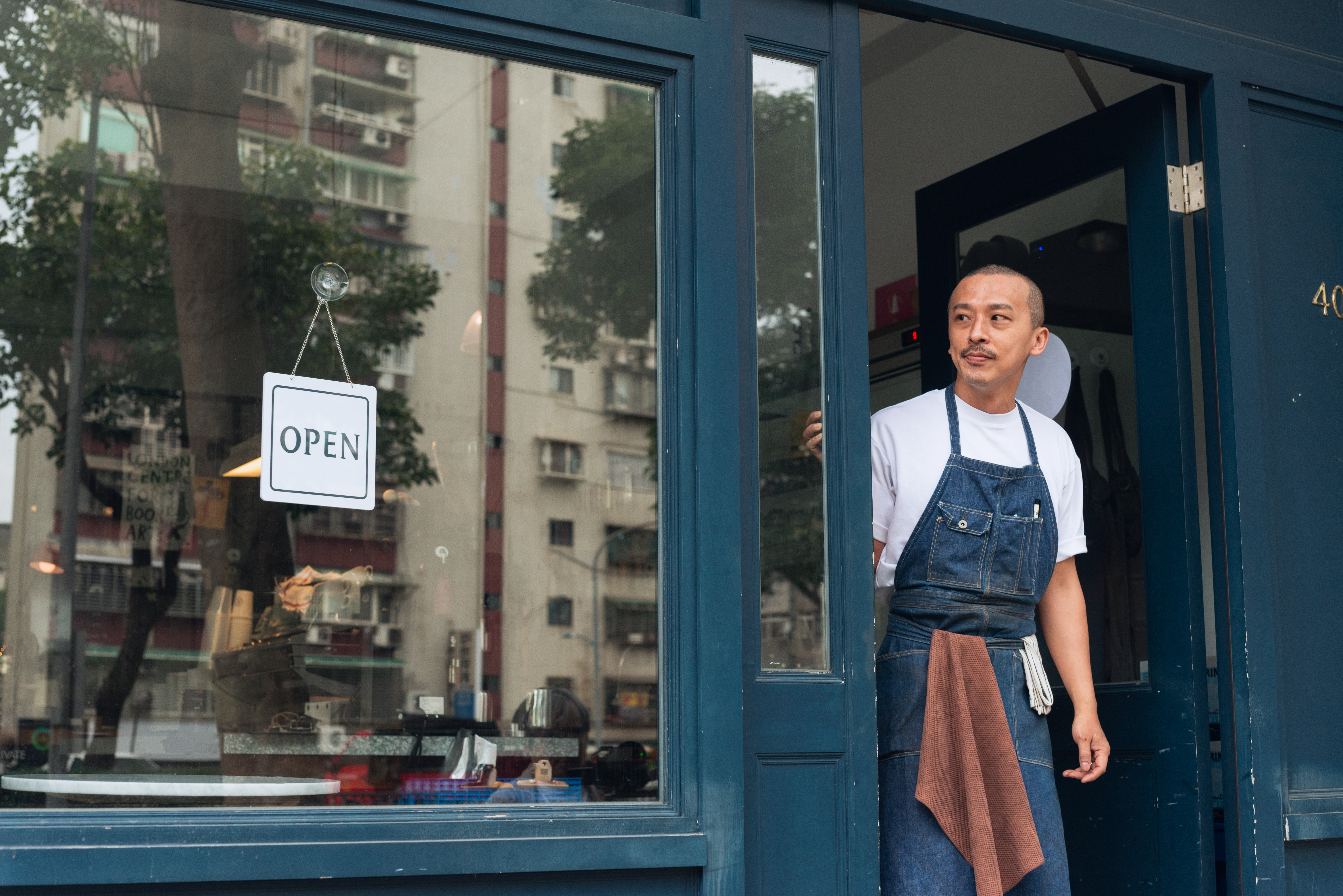
Tae Park, entrepreneur and borrower with Self-Help Credit Union, stands outside his grocery store, International Foods, in Raleigh, NC. Circa 2012.
While most of us have adjusted to living in a post-lockdown world, it’s hard not to acknowledge the deep, lasting impacts that COVID continues to have on our lives.
In this article, we discuss the challenges that AANHPI businesses have faced due to the pandemic and how we can uplift these businesses this Asian American, Native Hawaiian, and Pacific Islander (AANHPI) Heritage Month and beyond.
The Effects of COVID... and Bias

While business owners of all backgrounds struggled to keep things running in the height of the pandemic, one group was impacted disproportionately – AANHPI-owned businesses.
Not only do AANHPI-owned businesses make up huge percentages of the hospitality, restaurant, and retail sectors, which were the most impacted by lockdowns and travel restrictions, but the rise of anti-Asian hate compounded these effects. Asian restaurants
experienced an average of 18.4% drop in traffic compared to non-Asian restaurants in the same areas.1 That is estimated to be $7.42 billion in lost revenue in the year 2020 for these AANHPI-owned small businesses!1
Other AANHPI-owned businesses like lawyers, doctors, landscapers, and salons are expected to have experienced similar customer avoidance due to the harmful rhetoric that pinned AANHPI groups as the face of the pandemic.1
Back to Normal?
While it may seem like things have gone “back to normal,” AANHPI-owned businesses have been slower to bounce back than expected. This is partly due to added barriers in acquiring pandemic relief like the Paycheck Protection Program (PPP).
Only 66% of AANHPI-owned businesses were able to acquire PPP loans compared to 75% of white-owned businesses, likely due to a lack of banking relationships and language barriers.2
Support for AANHPI-owned Businesses

AANHPI-owned businesses are a vital part of our economy and society. Even though AANHPI people only make up 6.2% of the U.S. population, they represent nearly 11% of all employer firms in the country and provide over 5.2 million jobs.3,4
It’s important that we counter anti-Asian bias to support AANHPI entrepreneurs that bring tremendous value to our communities. Here are a few ways that we can better support AANHPI businesses:
Buy from AANHPI-owned small businesses: This may be an obvious one, but taking some time to research AANHPI-owned businesses in your area or online is a tangible way to support the AANHPI people in your communities. Keep
in mind that Asian cultures are not a monolith – next time you’re in the market for a good meal, try something less common like Burmese, Tibetan, or Hawaiian food, if these are options near you.
Include AANHPI businesses in your work: If you work with vendors, put on company events, bring in guest speakers, or have an influential platform, think about how you can collaborate with or highlight AANHPI-owned small
businesses in any of these capacities.
Identify your biases and make efforts to shift them: We all have biases that are ingrained in us on a subconscious level based on our experiences and the attitudes around us. What pre-conceived notions do you have about
Asian Americans, Native Hawaiians, and Pacific Islanders, and how might those ideas affect your actions? Even if you didn’t actively believe that Asian people were to blame for COVID, is it possible that all the headlines or
comments may have made you less likely to go into an Asian market or visit your AANHPI dentist?
At Self-Help, we believe in the value of community support, which is why it is important that each of us does our part to uplift small businesses around us that may be struggling due to unfair circumstances or mistreatment.
Resources for AANHPI-owned Business Owners
If you are an AANHPI business owner, check out this short list of tips and resources for you to build successful and sustainable businesses for years to come:
Access to funding and capital: Take advantage of organizations that offer grants and investment opportunities, such as the AAPISTRONG program
powered by the National Asian/Pacific Islander Chamber of Commerce and Entrepreneurship.
Small business loans with trusted financial institutions: Community Development Financial Institutions (CDFIs) are exactly what they sound like – they are committed to supporting communities, particularly ones that
are underserved. CDFIs (like Self-Help) offer small business loans to provide extra support to businesses
of all kinds and are willing to find ways to help without a big emphasis on your profit margins or collateral.
Financial coaching and resources: Many CDFIs and other organizations offer financial education such as financial coaching, courses, and resources at no additional cost to members. Topics like cash flow management, accessing
capital, and tax planning are great places to start to make sure your business is set up for success.
This AANHPI Heritage Month, we hope you are considering how you can support AANHPI businesses. The model minority myth has resulted in a gap in resources and support for AANHPI communities, but your actions can help AANHPI businesses recover,
thrive, and continue to serve our economy and communities for years to come! (Not sure what the model minority myth is? Check out our previous blog post, where we break it down for you).
Happy AANHPI Heritage Month!
Sources:
1 Huang, J.T., et al. "The cost of anti-Asian racism during the COVID-19 pandemic." Nature Human Behaviour 7 (2023): 682-695. https://doi.org/10.1038/s41562-022-01493-6.
3 Yellen, Janet L. "Remarks by Secretary of the Treasury Janet L. Yellen at Asian American, Native Hawaiian, and Pacific Islander Economic Summit." U.S. Department of the Treasury, May 8, 2024, https://home.treasury.gov/news/press-releases/jy2327.
4 MyAsianVoice, "Asian American Purchasing Power, Income, Wealth & Data Research," accessed May 26, 2024, https://www.myasianvoice.com/our-economic-power.